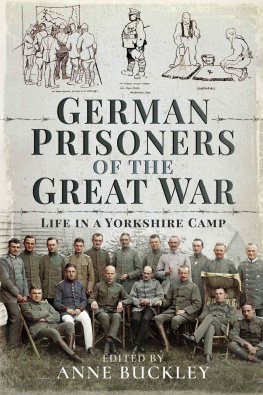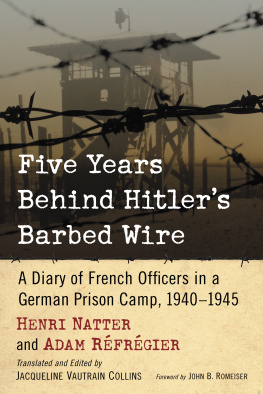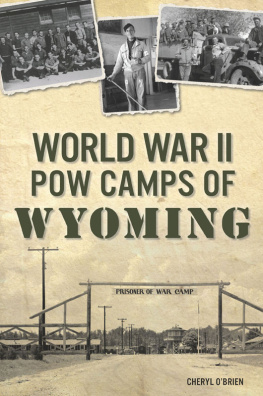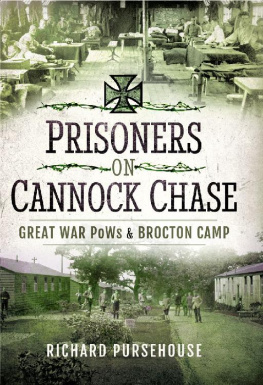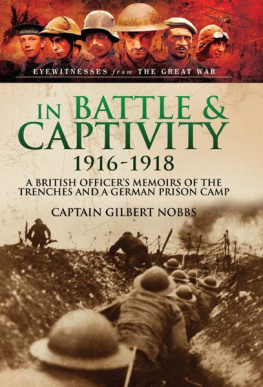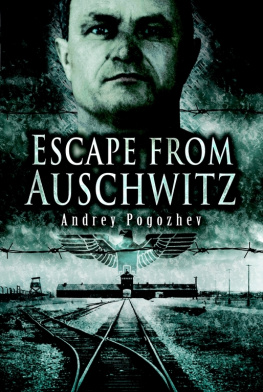Pagebreaks of the print version

German Prisoners of the Great War
Translators
Alison Abbey
Emily Bagshaw
David Booth
Lucy Bradbury
Keith Bradshaw
Anne Buckley
Ryan Bury
Ken Cockburn
Emily Darroch
Sheila Goodhall
David Hall
Keith Hewitt
Nigel Holden
Lauren Jones
Catriona McLachlan
Mhairi Montgomery
Hilary Potter
Alan Roberts
Sally Roberts
Isabella Rosenthal
Sabine Schlter
Toni-Marie Simcott-Omar
Charlotte Smith
Caroline Summers
Matthew Turner
Alison Tyas
Sue Vickerman
Ada Whitaker
Hannah Williams
Hannah Willmore
German Prisoners of the Great War
Life in a Yorkshire Camp
Edited by Anne Buckley
Translation edited by Anne Buckley, Caroline Summers, Alison Abbey and Ada Whitaker
First published in Great Britain in 2021 by
Pen & Sword Military
An imprint of
Pen & Sword Books Ltd
Yorkshire Philadelphia
Copyright Anne Buckley 2021
ISBN 978 1 52676 529 1
eISBN 978 1 52676 530 7
Mobi ISBN 978 1 52676 531 4
The right of the editor and translators to be identified as Authors of this work has been asserted by them in accordance with the Copyright, Designs and Patents Act 1988.
A CIP catalogue record for this book is available from the British Library.
All rights reserved. No part of this book may be reproduced or transmitted in any form or by any means, electronic or mechanical including photocopying, recording or by any information storage and retrieval system, without permission from the Publisher in writing.
Pen & Sword Books Limited incorporates the imprints of Atlas, Archaeology, Aviation, Discovery, Family History, Fiction, History, Maritime, Military, Military Classics, Politics, Select, Transport, True Crime, Air World, Frontline Publishing, Leo Cooper, Remember When, Seaforth Publishing, The Praetorian Press, Wharncliffe Local History, Wharncliffe Transport, Wharncliffe True Crime and White Owl.
For a complete list of Pen & Sword titles please contact
PEN & SWORD BOOKS LIMITED
47 Church Street, Barnsley, South Yorkshire, S70 2AS, England
E-mail:
Website: www.pen-and-sword.co.uk
Or
PEN AND SWORD BOOKS
1950 Lawrence Rd, Havertown, PA 19083, USA
E-mail:
Website: www.penandswordbooks.com
Foreword
by Wolf Kahler, grandson of Fritz Sachsse
I first met my grandfather Fritz Sachsse in 1944, towards the end of the Second World War when I was four years old. We had moved to an eastern part of Germany to a farm belonging to friends of his in order to escape the British bombing on Kiel. On my grandfathers visits from his home in Stralsund he was a very caring and gentle man and was there for us. He built a kite for me and showed me how to fly it in the fields around the farm. Of course, the prisoners had flown kites in the camp very effectively. After the war, the second global conflict for him and many others of his generation, Stralsund, now in a divided Germany, became part of East Germany and he couldnt visit us back in Kiel freely. But when he came he always spent time with us children and showed and taught us things like various card games and I learned the Gothic writing from him in my early teens. In his later years he moved to be with his older daughter in Gttingen, West Germany, where he died in 1954. He was old enough by then to be allowed by the East German regime to leave for the West.
When I was contacted by Anne Buckley about the book my grandfather Fritz Sachsse had edited about life in the prisoner-of-war camp in Skipton in Yorkshire during the First World War, I was very pleasantly surprised that she and her colleagues from the German department at the University of Leeds were translating the book into English. The prisoners had smuggled the pages out of the camp on their release. Although I knew that a book with a big red spot on the cover belonged to our family and I had opened it and had read some of it, I was not aware of its significance as a text detailing the experiences of prisoners of war in England and how German and British cooperation was achieved among them. Anne told me that my grandfather, my Opa, had played a major part in encouraging the prisoners to keep and open their diaries to put the book together and he had inspired the men in many other ways and had helped to organise the life in the camp and look to the future, to life after the camp.
I had known through my family that my grandfather had been a prisoner of war in the First World War in the north of England and had escaped from a prisoner-of-war camp in Japan after the Japanese had invaded Tsingtao, where his ship, the Iltis , had been scuppered. But when I and my wife, who is from Leeds herself, came to unveil the information board at the actual site of the original prisoner-of-war camp surrounded by many smiling local people I was very moved and felt privileged to have been given this opportunity to be close to where my grandfather and his fellow prisoners and the guards had spent the last years of that war. The prisoners had been fortunate to have been in this particular camp at Skipton.
There is so much in this book, so much detail about the mens daily lives as prisoners of war, about the problems that had to be overcome and the preparations for their eventual return to Germany. It is written with such communal spirit and humour, it is so surprising to see how this all was achieved in captivity.
My grandfather in his foreword said, let this book make its way into the outside world. Exactly a century later I am delighted to see this English translation of his work make its way into the world and I hope it will show the reader that humanity and understanding and suffering and hope as described in this book still play a part in our lives and give us a deeper sense of the impact of war.
Thanks and Acknowledgements
T his book represents the culmination of five years of work by a large number of people. Many were directly involved in the production of this book, whilst still more were involved in closely related work which influenced the final product.
Firstly I would like to thank the translators (listed on p. ii) and my co-editors Dr Caroline Summers, Ada Whitaker and Alison Abbey for their enthusiasm and commitment to the project, for their efforts in making sense of words written a century ago, and their painstaking attention to detail in our work to capture these messages in English.
I would also like to express my gratitude to proofreaders Christine King, Heather Hughes, Professor Sally Johnson and Rob Sanders who made many valuable suggestions for improvement to the English text, in addition to spotting our errors.
I am extremely grateful to a number of scholars who are experts on the subject of prisoners of war and internment for the support, encouragement and advice they have provided to me as a newcomer in this field: Professor Panikos Panayi, Professor Matthew Stibbe, Dr Brian Feltman, Dr Oliver Wilkinson, Dr Reinhard Nachtigal, Professor Isabella von Treskow, Dr Berhard Lbbers, Professor Stefan Manz and Professor Tim Grady. I appreciate hugely the detailed advice and valuable feedback offered to me by Professor Tim Grady while I was working on the introduction to this book.
I would also like to thank my colleagues in the German department at the University of Leeds who have supported and encouraged me: Professor Ingo Cornils, Professor Ingrid Sharp, Professor Frank Finlay, Professor Stuart Taberner, Dr Helen Finch, Dr Chris Homewood, Dr Jane Wilkinson, Dr Corinne Painter, Dr Stephan Petzold, Anne Markovic, Judith Eberharter and Wolfgang Keinhorst. Among these I am particularly indebted to the German native speakers for their help with the comprehension of archaic and obscure parts of the German text. A very special mention must go to Dr Caroline Summers who started the project to translate Kriegsgefangen in Skipton in 2014 and has been most generous with her advice and support. I am also grateful to Dr Hilary Potter, who assisted with the supervision of the student translators and with public engagement events.

